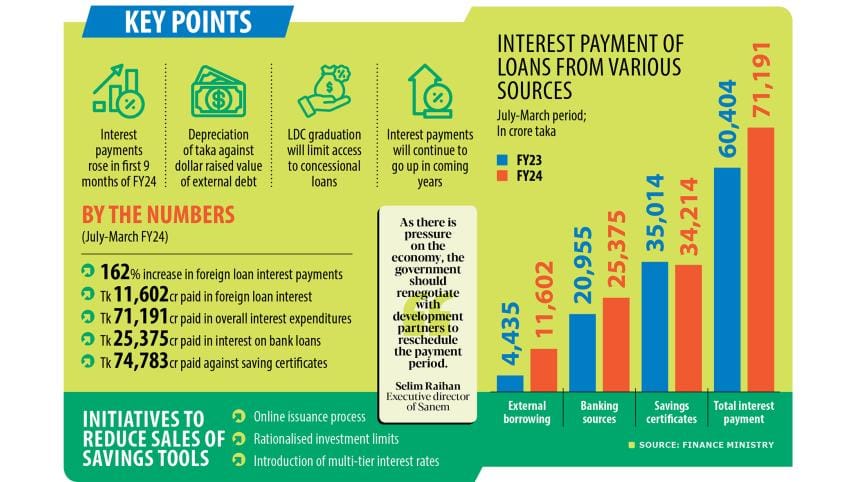Interest payment for foreign loan jumped 162% in Jul-Mar of FY24

Interest payments against foreign loans shot up 162 percent year-on-year in the first nine months of the last fiscal year as debt servicing of loans taken for some mega projects has started.
According to the finance ministry's "Quarterly Debt Bulletin" released yesterday, Tk 11,602 crore was paid as interest on foreign loans in the July-March period of FY24.
That number stood at less than half in FY23, amounting to Tk 4,435 crore.
"This is because the government has started paying interest against some major foreign loans," the report said.
A finance ministry official said interest payments against foreign loans are charged as soon as the loan is disbursed. However, a grace period is allowed before repayment of the principal amount.
Loans have been disbursed for several mega projects, including the Russia-funded Rooppur Nuclear Power Plant. As a result, interest payments have started, the official said.
Overall, the government's outlay on interest payments for both foreign and domestic loans increased by 18 percent to Tk 71,191 crore in the nine-month period. At the same time, interest payments against domestic borrowing increased by 7 percent to Tk 59,589 crore.
Prof Selim Raihan, executive director of the South Asian Network on Economic Modeling (Sanem), also said that one reason for the increase was the fact that interest payments against foreign loans for major projects had started.
He added that it would increase further in the coming days.
"As there is pressure on the country's economy, the government should renegotiate with the development partners to reschedule the payment period," he said.
In a report, titled Medium-Term Macroeconomic Policy Statement (MTMPS), the finance ministry said interest payments will continue to rise gradually in the coming years.
The proportion of external interest payments as a percentage of the national budget will rise to 2.6 percent in FY27 from 0.9 percent in FY22, reflecting the growing impact of external debt on the budget, according to the report.
It also said two major factors contributed to the increase in interest payments for foreign loans.
One factor is that the reference rates in advanced economies are expected to stay high. A reference rate is an interest rate benchmark that is used to set other interest rates. The Fed Funds Rate, the Secured Overnight Financing Rate (SOFR), and the prime rate are among the most common reference rates.
The other factor is that Bangladesh's graduation from the category of least developed countries in 2026 will gradually narrow the window to obtain concessional loans from external sources, according to the report. So, the pressure is higher now.
The report added that the implicit interest rate on external borrowing exhibited a gradual increase from 1 percent in FY21 to 2.6 percent in FY27.
"This increase is attributed to a higher proportion of borrowing through floating and semi-concessional rates, which are more sensitive to market fluctuations compared to fixed-rate financing."
It also mentioned that the depreciation of the taka against the US dollar has elevated the value of external debt when measured in terms of local currency.
In the case of domestic borrowing, although debt servicing against loans from banking sources increased, it decreased for non-bank borrowing, according to the latest finance ministry report.
In the first nine months of FY24, interest payments against loans from banking sources increased 21 percent to Tk 25,375 crore.
At the same time, interest payments against non-banking sources, mainly national saving certificates, stood at Tk 34,214 crore, which was Tk 800 crore lower compared to the year prior.
The government set a borrowing target of Tk 257,885 crore from both foreign and domestic sources in FY24. However, it could borrow only Tk 80,101 crore, or 31 percent of the target, in the first nine months. Of the amount, loans from domestic sources amounted to Tk 38,407 crore.
In the July-March period, the government borrowed Tk 53,407 crore from banking sources. But it did not borrow from non-banking sources. Rather, it repaid Tk 15,000 crore that it had borrowed previously.
In the case of non-banking borrowing, sales of saving certificates declined over the past few years.
In July-March of FY24, the government sold saving certificates worth Tk 62,238 crore and repaid Tk 74,783 crore against the loans. As a result, the government's net borrowing in the sector declined by Tk 12,545 crore.
The finance ministry report added that various reform initiatives, such as the online issuance process, rationalised investment limit and introduction of multi-tier interest rates along with inflation-induced pressure on savings, contributed to the reduction of the net sales of the national savings instruments.
At the end of March this year, the government's total outstanding debt stock was Tk 1,697,415 crore, which is 33.78 percent of the GDP.
Of the total figure, domestic debt is Tk 982,743 crore and external debt is Tk 714,672 crore.




 For all latest news, follow The Daily Star's Google News channel.
For all latest news, follow The Daily Star's Google News channel.
Comments